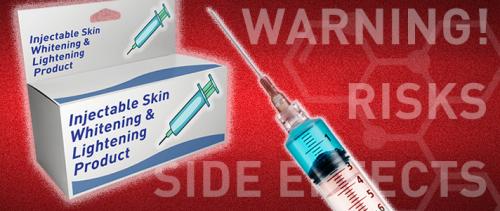Injectable Skin Lightening and Skin Bleaching Products May Be Unsafe

Consumers need to beware of products to lighten or whiten their complexion. These products, which include both injectable skin whitening and skin bleaching products, are potentially unsafe and ineffective, and might contain unknown harmful ingredients or contaminants.
Injectable skin whitening products are marketed for injection into a vein or muscle or under the skin. They are sold online and in some retail outlets and health spas. They often promise to lighten the skin, correct uneven skin tone, and reduce blemishes. Some products even claim to treat conditions such as liver disorders and Parkinson’s disease.
Although the average consumer might not assume so, these products are unapproved new drugs whose sales are not condoned by the U.S. Food and Drug Administration (FDA). The FDA has not approved any injectable drugs for skin whitening or lightening.
“These products pose a potentially significant safety risk to consumers. You’re essentially injecting an unknown substance into your body—you don’t know what it contains or how it was made,” says In Kim, a pharmacist at the FDA.
Beyond the potential harm from the product itself, improper or unsafe injection practices may transmit disease, cause infection, and result in serious injury.
On September 25, 2017, a federal judge ordered the New Jersey company, Flawless Beauty LLC, to halt sales and recall some of its products because they are unapproved new drugs that may be unsafe, putting consumers at risk. Flawless sold skin whitening and other products under the Relumins, Tatiomax, TP Drug Laboratories, Laennec, Saluta, Tationil, and Laroscorbine brands, among others.
“We have noticed a number of companies marketing injectable products for skin whitening online and are concerned that these products and their ingredients may cause serious harm to consumers,” Kim says.
The products sold by Flawless contain ingredients, including glutathione, vitamin C, collagen and even human placenta.
“In general, consumers should be cautious of any products marketed online with unproven claims about their safety and effectiveness,” Kim says. “Consumers also should consult with their health care practitioner before deciding to use any new drug product.”
What You Should Do
If you have used any injectable products for skin lightening or whitening and are experiencing side effects, consult a doctor as soon as possible. You or your doctor can also report an illness or injury you believe to be related to the use of these products by calling 1-800-FDA-1088 or visiting FDA online.
If you have questions about particular skin conditions, consult a health care professional. There are FDA-approved topical drug products to treat certain skin conditions, for example, hyperpigmentation (which causes the skin to darken) and melasma (which causes patches on the face).
Unlike the unapproved injectable skin whitening drug products, FDA-approved drugs have been determined by FDA to be safe and effective for their intended use. In addition, facilities where the approved products are made are generally subject to FDA inspection and must comply with FDA regulations and good manufacturing practices.
